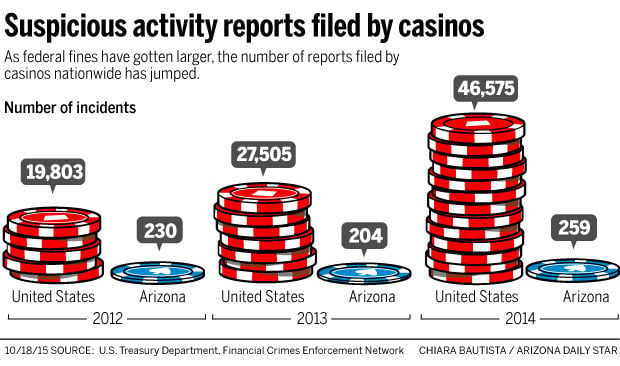Casino Money Laundering
- A Q&A on money laundering for casinos and online regulated poker websites. Executive Summary. Money laundering is a process in which so-called ‘dirty money’ from the proceeds of crime is transformed into ‘clean money’ or legitimate money or other assets, such as cars, art, homes or investments.
- Casino Money Laundering Was Out of Control, Cullen Commission Hears Some of the instances mentioned in the reports show that a single casino high roller was able to introduce a buy-in amounting to CA$900,000 in cash. This happened over the course of one day and casino management saw nothing suspicious about it.

Another type of suspicious activity is related to money laundering, where a casino patron may put large amounts of money in play, but gambles very little before cashing out. For example, a bank robber steals $50,000 from a large bank. Most banks mark cash with exploding dye. It highlights the anti-money laundering (“AML”) challenges faced by a predominantly cashed-based industry, and also underscores the systemic issues that have made B.C.’s gaming industry an alleged breeding ground for money laundering: a dysfunctional, fragmented regulatory regime that lacks independence.
WASHINGTON, DC – The Financial Crimes Enforcement Network (FinCEN) today imposed a $10 million civil money penalty against Trump Taj Mahal Casino Resort (Trump Taj Mahal), for willful and repeated violations of the Bank Secrecy Act (BSA). In addition to the civil money penalty, the casino is required to conduct periodic external audits to examine its anti-money laundering (AML) BSA compliance program and provide those audit reports to FinCEN and the casino’s Board of Directors.

Trump Taj Mahal, a casino in Atlantic City, New Jersey, admitted to several willful BSA violations, including violations of AML program requirements, reporting obligations, and recordkeeping requirements. Trump Taj Mahal has a long history of prior, repeated BSA violations cited by examiners dating back to 2003. Additionally, in 1998, FinCEN assessed a $477,700 civil money penalty against Trump Taj Mahal for currency transaction reporting violations.
Bicycle Casino Money Laundering



'Trump Taj Mahal received many warnings about its deficiencies,' said FinCEN Director Jennifer Shasky Calvery. 'Like all casinos in this country, Trump Taj Mahal has a duty to help protect our financial system from being exploited by criminals, terrorists, and other bad actors. Far from meeting these expectations, poor compliance practices, over many years, left the casino and our financial system unacceptably exposed.'
Trump Taj Mahal admitted that it failed to implement and maintain an effective AML program; failed to report suspicious transactions; failed to properly file required currency transaction reports; and failed to keep appropriate records as required by the BSA. Notably, Trump Taj Mahal had ample notice of these deficiencies as many of the violations from 2012 and 2010 were discovered in previous examinations.
Director Shasky Calvery expressed her appreciation to the Internal Revenue Service, Small Business/Self-Employed Division, which performed the examinations of Trump Taj Mahal, for their contributions to the investigation and for their strong partnership with FinCEN. She also thanked the Commercial Litigation Branch of the U.S. Department of Justice for their assistance with this enforcement action.
Trump Taj Mahal petitioned for bankruptcy in September 2014. That bankruptcy remains pending. The Bankruptcy Court approved of Trump Taj Mahal’s settlement on March 4, 2015.
Casino Money Laundering
FinCEN seeks to protect the U.S. financial system from being exploited by illicit actors. Its efforts are focused on compromised financial institutions; third-party money launderers; transnational organized crime; terrorist and other security threats; significant fraud; and threats to cyber security. FinCEN has a broad array of enforcement authorities to target both domestic and foreign actors affecting the U.S. financial system.
Casino Money Laundering Cases
FinCEN's mission is to safeguard the financial system from illicit use and combat money laundering and promote national security through the collection, analysis, and dissemination of financial intelligence and strategic use of financial authorities.